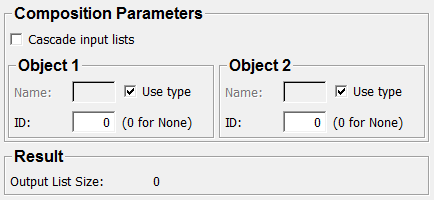ComposeBaseList¶
- MLModule¶
genre
author
package
dll
definition
see also
DecomposeBaseList,ExtractObjectFromList,SaveBase,LoadBasekeywords
Purpose¶
The module ComposeBaseList composes two or more ml.Base objects into a single structure, enabling export/import to/from a single file.
Since ml.BaseList are also ml::Base objects, complex object trees can be constructed. Additionally, this module allows for simply joining two BaseLists by creating a new one that unites the elements of both lists.
Usage¶
Attach a Base connection to the left and to the right input field. Decide whether an input BaseList shall be treated as a solitary object and connect the BaseList at the output to, e.g., a SaveBase operator.
Details¶
You can also specify names and IDs for the input objects that will be stored in the BaseList for later decomposition. By default, the type names will be used as names. Uncheck the checkboxes Use type and Use type to provide your own names for the object.
Windows¶
Default Panel¶

Input Fields¶
The module has two Base inputs that can be connected to any Base (-derived) object.
inObject1¶
- name: inObject1, type: MLBase, deprecated name: inputBase0¶
inObject2¶
- name: inObject2, type: MLBase, deprecated name: inputBase1¶
Output Fields¶
The module has one Base output that is always of type BaseList.
outList¶
- name: outList, type: MLBase, deprecated name: outputBaseList¶
Parameter Fields¶
Field Index¶
|
|
|
|
|
|
Visible Fields¶
Cascade input lists¶
- name: cascadeMode, type: Bool, default: FALSE¶
If checked, an input BaseList is stored as a single item of the resulting output BaseList.
Otherwise, each input BaseList will be decomposed first, and all their items will be taken over as items of the resulting output BaseList.
Note that, when joining two BaseLists with this parameter disabled, you will not be able to decompose the resulting list later into just the same lists as they were before (or at least not with a single usage of a
DecomposeBaseListmodule). However, there is most likely a workaround, using multiple decomposition/composition modules.
Output List Size¶
- name: outputSize, type: Integer, persistent: no¶
Sets a maximum amount of items for the output list. A value of 0 means no limit.
ID (objectId1)¶
- name: objectId1, type: Integer, default: 0¶
Sets IDs to the input objects and stores them within the resulting lists (not within the objects themselves, though).
This does not work for an input BaseList that is decomposed into its elements (treat BaseLists like regular objects disabled). If the ID 0 is selected, no ID will be assigned to the object at all.
ID (objectId2)¶
- name: objectId2, type: Integer, default: 0¶
Sets assigned IDs to the input objects and stores them within the resulting lists (not within the objects themselves, though).
This does not work for an input BaseList that is decomposed into its elements (treat BaseLists like regular objects disabled). If the ID 0 is selected, no ID will be assigned to the object at all.
Name (objectName1)¶
- name: objectName1, type: String, deprecated name: leftObjectName¶
Sets names to the input objects and stores the names within the resulting lists (not within the objects themselves, though).
This does not work for an input BaseList that is decomposed into its elements (treat BaseLists like regular objects disabled). If connecting an input field to a Base output field, the type of the object contained will be taken as default name.
Use type (useObjectType1)¶
Name (objectName2)¶
- name: objectName2, type: String, deprecated name: rightObjectName¶
Sets names to the input objects and stores the names within the resulting lists (not within the objects themselves, though).
This does not work for an input BaseList that is decomposed into its elements (treat BaseLists like regular objects disabled). If connecting an input field to a base output field, the type of the object contained will be taken as default name.